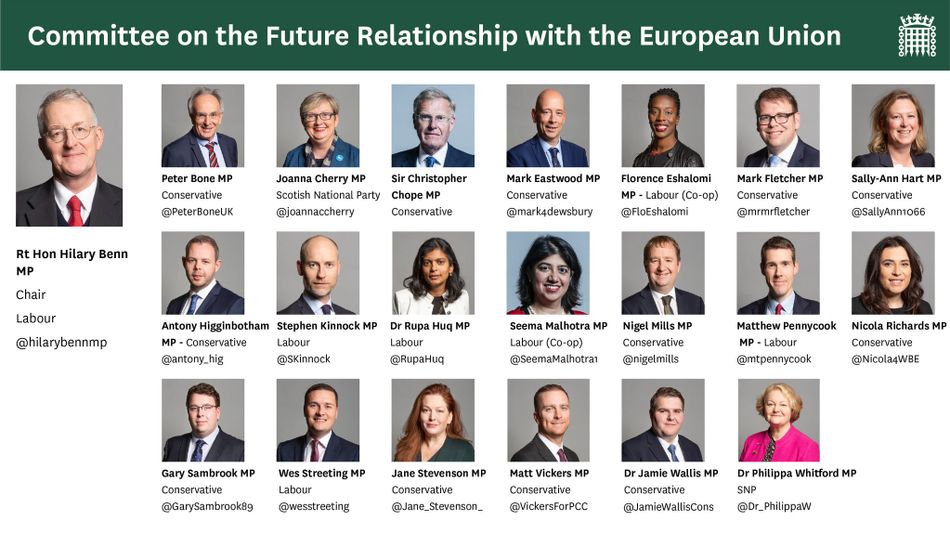Traffic crossing the border between the Republic of Ireland and Northern Ireland in the village of Bridgend, Co Donegal. Photo: Brian Lawless/PA Wire/PA Images
This week, the House of Commons’ Committee on Exiting the European Union welcomed a new name and new set of faces. Now called the Future Relationship With The EU Committee, its new title is one of a number of symbolic shifts in parliament to reflect the UK’s new status outside of the EU. However, among the list of MPs appointed to the committee, there is one concerning fact: none of them represents a constituency in Northern Ireland.
After the flurry of sudden and belated interest following the 2016 referendum, Northern Ireland’s place in the Brexit debate has dropped back off the news agenda. Scenes of reporters standing soggy in the Newry rain to explain the latest twists in the border saga, briefly a nightly fixture on news bulletins, are now nowhere to be seen. Similarly, the once-furious daily debates in the House of Commons and on radio airwaves about protecting Northern Ireland’s peace process have abated.

Borders in the sea
Despite the fact that the UK’s exit from the EU has technically taken place now, the Brexit saga still has a long way to run. Prime Minister Boris Johnson’s Brexit deal succeeded in avoiding a hard border on the island of Ireland by, essentially, moving Northern Ireland’s border from the land to the sea.The region has left the EU along with the rest of the UK but will continue to follow many EU customs rules. This avoids a border on the island by ensuring regulatory alignment on many aspects with the Republic of Ireland.
Different customs rules between Northern Ireland and the rest of the UK, however, will entail that some form of customs checks on goods between the region and Britain.
A brazen u-turn
The arrangement was a brazen u-turn on Boris Johnson’s pledge to the DUP that Northern Ireland would leave the EU on the same terms as the rest of the UK. But despite the unionist party’s protestations, it has been accepted by a Conservative majority government which no longer needs DUP votes—as well as by a weary public whose patience over the Northern Ireland “question” has worn thin.The issue is far from solved, however. It is not clear exactly what checks will be involved in the new arrangement, what burden it will place on businesses or what impact it will have on Northern Ireland’s status within the UK.
Furthermore, it is not clear yet how loyalists—supporters of Northern Ireland’s place in the UK, a hardline minority of which engaged in violence during the Troubles to express the strength of their feelings—will react.
The threat of violence is lower than that of dissident Republicans who oppose a land border on the island, partially due to loyalists having fewer resources and less ideological coherence, but it still exists.
Denied a voice
The announcement that no MPs for Northern Ireland constituencies will sit on the Future Relationship with the EU Committee is therefore deeply worrying and denies Northern Ireland’s residents a voice on this crucial issue. It appears to stem from a misguided belief that “the Northern Ireland problem” was a specific, finite issue which has been solved and the region can once again be put out of sight and out of mind. This is far from the case.This approach risks repeating the mistakes made by politicians in Britain during the referendum campaign and early years of Brexit negotiations. During this time, Northern Ireland was seldom considered—until it became an insurmountable problem, and was given sudden focus by baffled MPs scrambling to learn basic facts.
If the last few years of British politics have shown anything, it is that poor knowledge of Northern Ireland does not serve the House of Commons or the wider United Kingdom well.
"Ripping up" the Good Friday Agreement
Indeed, the seeds of another major misstep about Northern Ireland and Brexit appear to have been already sown: based on a fundamental ignorance of a basic element of Northern Ireland’s peace process.At the weekend, the Sunday Telegraph reported that the UK will threaten to no longer comply with the European Convention on Human Rights, as an attempt to gain leverage in future Brexit talks. This is despite the fact that the ECHR is enshrined in the Good Friday Agreement, the 1998 agreement that ended most of the violence of the Troubles.
Its inclusion is an important ballast for guaranteeing human rights in the region where so many abuses occurred due to the Troubles conflict, and groups such as Amnesty International have warned that withdrawing from the convention would “rip up the Good Friday Agreement.”
It is not clear if the UK really does have the leverage it claims or if, just like its previous posturing about allowing a hard land border, its showmanship will fall flat when faced with the importance of this crucial Northern Ireland peace text.
The future for Northern Ireland
The last few years of Brexit talks have confirmed the suspicions of many in Northern Ireland that many British MPs know little about the region and care even less.To avoid a repeat of this error, MPs should look to continue to include Northern Ireland in the next stage of Brexit processes—rather than slip back into the centuries-old status quo of giving the region little consideration until it is at crisis point. A committee seat would be a small, but useful, way to start.












